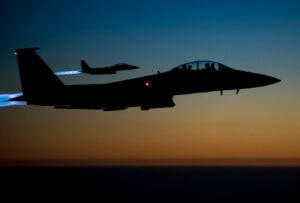Russia Winning Info & Electronic War In Syria, US & UK Generals Warn
Posted on

Russian Krasukha-2 electronic warfare system with dish deployed. The system was reportedly used in Syria.
AUSA CONFERENCE: Two recently departed commanders of coalition forces in Iraq and Syria say that the biggest takeaways from the fight are how badly the coalition was outplayed in the global battle to control the narrative. The Russians also jammed US communications in the warzone itself — and all these complex threats are emblematic of future wars to come.
“The Russians are really good at this, better than us,” said the UK’s Maj. Gen. Felix Gedney, who just wrapped up a year as deputy commander of Operation Inherent Resolve. “We saw a very clever, assiduous information campaign aimed at discrediting the campaign of the coalition. And I would argue, in many of our nation’s capitals, we didn’t realize we were being played.”
The coalition military command based in Baghdad would pump out press releases touting land recaptured from ISIS and issue statements refuting reports of civilian casualties resulting from coalition bombing missions, Russia coordinated entire campaigns to produce feel-good photo ops of its soldiers delivering food to civilians.
That information campaign was met on the other side by years of slickly-produced videos pumped out by ISIS showing beheadings, issuing warnings, and footage of fighters capturing US-made equipment abandoned by Iraqi troops.
“In the information domain, our freedom to operate is often constrained, rightly, by higher-level strategic issues,” Gedney added. Those strategic and political issues — the Iraqis were understandably sensitive to anything that suggested Baghdad wasn’t in control of its own security — combined to leave “a gaping vacuum in terms of the narrative that made it easy for our adversaries to fill it with theirs.”
Lt. Gen. Paul Funk, who handed off control of US and coalition forces in Iraq and Syria in September, added that the Russian mastery of information extends to the electromagnetic spectrum, where their electronic warfare (EW) units repeatedly disrupted US communications.
“In Syria, you have multi-domain warfare where you’re getting an information warfare effect and an EW effect” every day, he said. Adversaries like Russia “want to take us on in the edges, in the information space, or in EW,” he added. He confirmed reports that US forces operating in Iraq and Syria have to fight through degraded communications on a daily basis, both due to hostile jamming and the physical distance between small units in the field.
Funk, now commander of the Army’s III Corps, said that in those fights, “most of that is not kinetic, most of it is on the outside, on the edges, but it’s a constant churn.”
One former officer who was involved in the OIR mission told me that US pilots were “painted” by Syrian radar on a daily basis. They often had to contend not only with electromagnetic jamming but the constant physical presence of Russian and Syrian aircraft operating close by.
There were many times when the Syrian air defenses would launch a missile close by, but US pilots were rarely certain if they were the intended targets, the officer said.
The congested airspace pilots are still working through over Syria — with coalition manned and unmanned aircraft, to Syrian warplanes, Iranian drones, and Russian bombers, jets, and drones — is a sign of things to come in future wars, Gedney warned.
“We will never deploy again to a theater of operations where we are not under threat from unmanned aerial systems. Both those high-end systems of our near-peer competitors, and lower, off-the-shelf, botched-together systems that are developed by asymmetric enemies. And we need to get used to that.”
In addition to the Russian-made, Syrian-operated air defenses, more sophisticated Russian electronic warfare capabilities have hit US aircraft operating over Syria.
In April, the head of US Special Operations Command, Gen. Raymond Thomas, called Syria “the most aggressive EW environment on the planet from our adversaries. They are testing us every day, knocking our communications down, disabling our EC-130s, etcetera.”
Just this month, Russia delivered three battalion sets of its S-300 air defense systems to Syria in response to the mistaken shootdown of a Russian surveillance plane by an older Syrian air defense system.
Both Moscow and Damascus blamed Israel for the incident, saying Israeli planes bombing sites near Damascus used the Russian plane as cover.
Subscribe to our newsletter
Promotions, new products and sales. Directly to your inbox.




